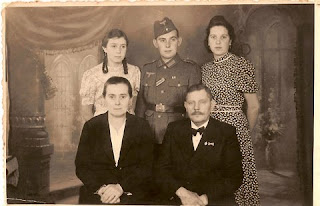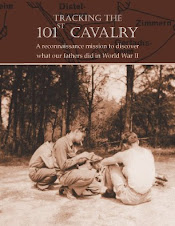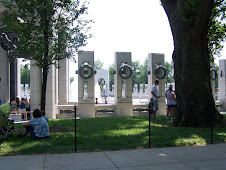 When Buck Fluharty sent me a packet of photos (See earlier post, “Fluharty’s Photos.”) he included a photo of three women: Magdalena Levasier and her daughters, Anna and Regina. At the end of the war, he had been billeted in their home for a short time.
When Buck Fluharty sent me a packet of photos (See earlier post, “Fluharty’s Photos.”) he included a photo of three women: Magdalena Levasier and her daughters, Anna and Regina. At the end of the war, he had been billeted in their home for a short time.“I wonder what ever happened to them,” he wrote.
That one question has shown me how small the world really is.
With only a shred of hope, I sent an e-mail to the tourism department of the city, hoping someone in that department might speak English. My letter ended up in the hands of Petra Wooden, who was born and raised in Lorsch, but had also spent 20 years in the U.S. Air Force and spoke perfect English. She said she would be happy to help me.
In just a few days she not only had located the Levasier sisters, now Anna Gutschalk and Regina Brunnengräber, but had contacted them. They would be willing to see me when I came to Germany.
Lorsch was my next-to-the-last stop in Germany. Petra picked me up and drove me to Frau Brunnengräber’s house around 3 p.m. one afternoon. We picked her up, and then drove to Frau Gutschalk’s. Frau Gutschalk, who lived in the same house where they had lived in 1945, had just had surgery, so I promised to keep the visit short.
On the outside, the house looked much the same as it had in 1945. It had been updated, but the shape and the windows remained as they had been. Inside, the walls were covered with family photos, icons, and crosses, and the windows were covered with lace curtains.
Although neither sister spoke English, and I spoke almost no German, I understood the one phrase they repeated over and over: “We never thought of each other as enemies, only as friends.”
It was a short meeting since Anna was so recently home from the hospital and because the language barrier made easy conversation difficult.
Once home, I thought of these two ladies often and wished I could somehow convey what meeting them had meant to me.
More than a year after my trip to Germany, I received an email from a woman who expressed surprise in finding photos of her two aunts on my website. Her father was their brother, Valentin, who had spent the war on the Russian front. He didn’t come home from the war.
She and I have written back and forth – she now lives in Canada. We both wish we knew more about our fathers and what it was like for them in the war. She has sent me more photos: photos of her father, her grandmother and grandfather, and her aunts. From her cousin, who lives in Germany, have come photos of even more American soldiers stationed near Lorsch after the war.
I can’t help thinking of ripples in a pond, in spite of knowing better than to fall back on clichés. In 2003, I wanted to find one or two men who could help me know what my father did in the war, so I threw in a stone. I hoped to raise a ripple or two. Instead I am amazed by the rush of waves.





No comments:
Post a Comment